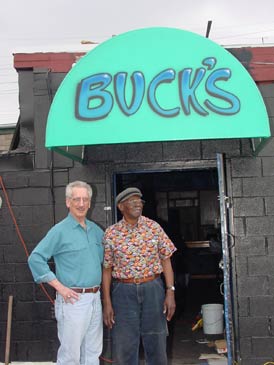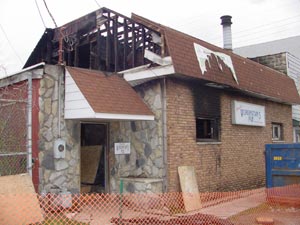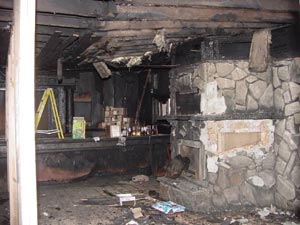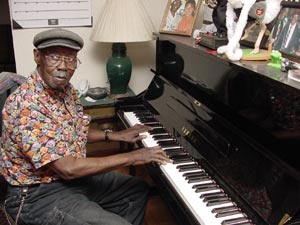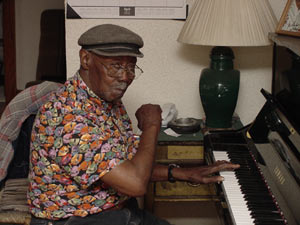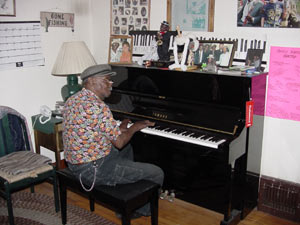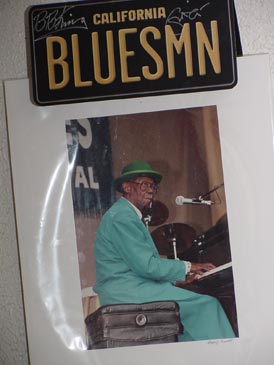Al: I didn't know about the electrical problem; I heard that your music was hot. Pinetop: No, it's cold now since I got to be eighty-years old, I don't play like I used to. But I do the best I can. Al: I read on the Internet that you were eighty-nine. Pinetop: Eighty-eight, but on July 7th , I'll be eighty-nine. Al: How much damage was done to Buck's place? Pinetop: Oh, pretty good. It did a whole lot of damage. Al:How long will it be before it's back up and running again? Pinetop: Well, I don't know. I don't know when they started fixing it up. I would like to go there and see how things are going.
Al: How did you and Buck get together? Pinetop: Oh, Buck found me in Chicago. He told me, "I've got a place and you don't have to work too much." I said, "That's what I want!" Al: How long have you been at Buck's? Pinetop: About three years.
Al: How many brothers or sisters did you have? Pinetop: I had a sister. My mother just had two kids...me and her. I was the baby. Al: Did you do a lot of touring way back then? Pinetop: Oh, a whole lot. Back in those days, I traveled with Robert Nighthawk. I played a guitar then, and we went everywhere-all over the place.. Al: Mostly down south? Pinetop: Yes, down South. Al: What's the story about the angry chorus girl in Helena, Arkansas? I read that you were knifed by some dance hall girl. Pinetop: Oh, yes. Right there on my wrist, can you see the scar? Al: Can't miss that wound. What happened? Pinetop: Oh, she came back there where I was with everything showing. Well, it is a long story, but she came after me with that knife. It took me a pretty good while to recover. I had to quit playing the guitar and started the piano. Of course, I played the piano for a long time with one hand. People would say that I played better with one hand than most did with two.
Al: How is that different from jazz though? Pinetop: Jazz is more lively, blues is more....depressed. Al: Did you ever sing? Pinetop: I sang a little once in awhile. I'll sing to that lady at your side.
Al: So, you don't like normally to play on Sunday? Pinetop: No...I don't play on Sunday....if I play its church hymns Al: If you hadn't been a musician, what would you have done? Pinetop: I wish I would have gotten some kind of good job, but I didn't get good schooling and coming up when I come up, then my grandmother run me away from home. I went out on my own ever since.
Al: How old was she? Pinetop: Oh, she was like 70 or 80 years old. Al: And she knocked you out? Pinetop: Yes, knocked me out and when I did come to she was still beating me...man oh man. I left there, didn't carry no sacks out there or nothin'. They didn't find me for two or three months later. Al: Was that when you went on the road to play or did you do something before that? Pinetop: I kind of done a little bit before that-going out playing for parties and stuff. I played the guitar then. Al: Who was your music idol back then? Pinetop: I liked some of the jazz bands: Count Basie and Slim Milton. Al: Did you see yourself more as a blues pianist than a jazz pianist? Pinetop: Yes, blues...not no jazz.
Al: Do you ever spend much time in New Orleans? Pinetop: Yes I have when I was with Muddy. We were always playing there for festivals and stuff. Al: You got an award by the National Endowment for the Arts a couple of years ago with an award of $10,000. Pinetop: Who got that?? Al: You got it. Pinetop: Oh, I guess I did. Al: On the Internet, they described your piano technique by saying that you play with your right hand the horn sounds and you play the bass with your left hand. Is that something that you discovered yourself or is that something that you learned from somebody? Pinetop: Well, I did that myself. Al: What's the story behind you and the Blues Brothers? Pinetop: I love them boys!
Al: But, it just seems to me that there is something within African Americans that is able to do music and feel it that whites can't get. Lots of white people have suffered, a lot of the white people are depressed and have blues, but they are not able to make the transition from the feeling to the music. Pinetop: White people weren't born in the blues. We came up the hard way and that made us have the blues.
Al: He made lots of money, had a big name, and everybody knew him. Did he play less well once he became popular? Pinetop: Well, I'll tell you, when he was with us, he didn't hardly play too much. We would call him up there, and he would play. He didn't do too much; we did it. Al: How have the blues changed over your lifetime? Pinetop: Everything is in the blues and guitar. Al: Do you think they have watered it down? Pinetop: They have watered the blues down now. These white boys play a lot of guitar, man. All the guitars-it sounds funny to me. Al: In the eighty-eight years that you have been around, a lot of things have changed in America besides the blues. How have you seen America change? Pinetop: America has changed a lot! Al: What do you remember back in the old days down South? Pinetop: Hard times....and some good time. But, hard times give you the blues. Al: When you started playing back when you were young, you played in mostly black clubs right? Pinetop: Mostly black clubs.
Al: What haven't you done in life that you would like to do? Pinetop: I would like to make some money. Al: Then what are you going to do with the money? Pinetop: What would I do with it now? I'd rebuild the club.
Al: You think you will see your grandmother? Pinetop: No, I wouldn't be particular about seeing her no how. She did me wrong when I was young. Some scenes from Pinetop's life....
|







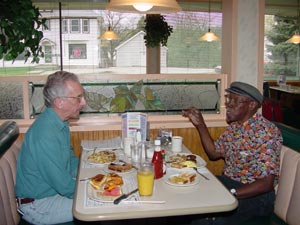 Al: How do you want to be addressed? Do you
go by Pinetop or Pine or Top or Willie
or what?
Al: How do you want to be addressed? Do you
go by Pinetop or Pine or Top or Willie
or what?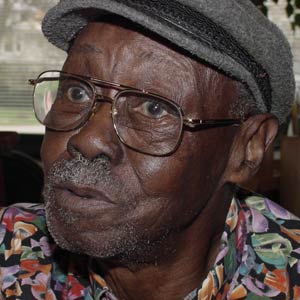 Al: I would like to do that. Let's go eat
and talk then go to Buck's. When did you move from Chicago to LaPorte?
Al: I would like to do that. Let's go eat
and talk then go to Buck's. When did you move from Chicago to LaPorte?
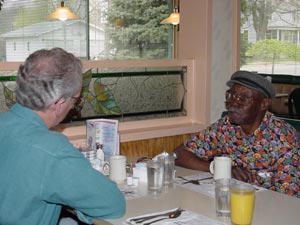 Al: I did a lot of researching about you for
this interview. I found out that you were born in Mississippi.
Al: I did a lot of researching about you for
this interview. I found out that you were born in Mississippi.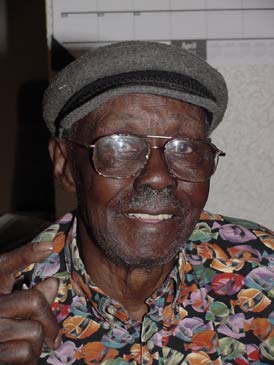 Al: You have known and played with most of
the great Blues musicians. How did you come to meet Muddy Waters?
Al: You have known and played with most of
the great Blues musicians. How did you come to meet Muddy Waters?
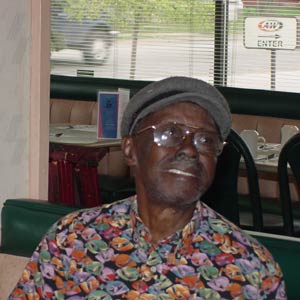 Al: You'd better watch it, Pinetop! That
lady is my wife.
Al: You'd better watch it, Pinetop! That
lady is my wife. Al: Why did she run you away?
Al: Why did she run you away?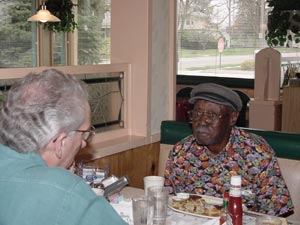 Al: The blues is primarily Chicago isn't it?
Al: The blues is primarily Chicago isn't it?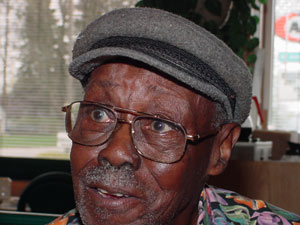 Al: Weren't the Blues Brothers patterned after you and your group?
Al: Weren't the Blues Brothers patterned after you and your group?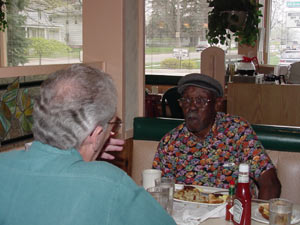 Al: I understand suffering produces the
blues, but take Muddy Waters: he understood the blues because of his past. Once
he became a household name, wouldn't that destroy some of his talent? If being
kicked around by life makes you write the blues, then when you are on the top,
haven't you cut out some of your ability to make music...real music?
Al: I understand suffering produces the
blues, but take Muddy Waters: he understood the blues because of his past. Once
he became a household name, wouldn't that destroy some of his talent? If being
kicked around by life makes you write the blues, then when you are on the top,
haven't you cut out some of your ability to make music...real music?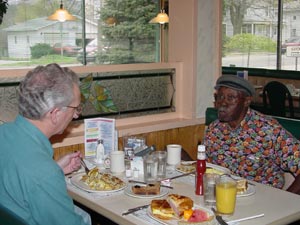 Al: When were you able to get into
predominantly white clubs?
Al: When were you able to get into
predominantly white clubs?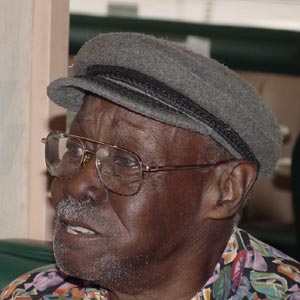 Al: We will drive past there and see how
things look. It will give the club some free publicity. Pinetop, how do you
account for living so long?
Al: We will drive past there and see how
things look. It will give the club some free publicity. Pinetop, how do you
account for living so long?